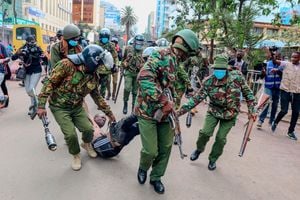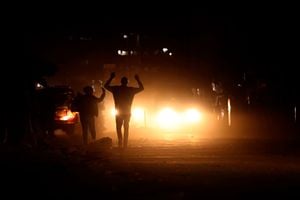
Demonstrator during anti-tax protests in Nairobi on June 20, 2024.
On Wednesday, a day after protesters entered Parliament, Deputy President Rigathi Gachagua addressed a press conference, shortly after a live national address by President William Ruto, during which the President made major concessions, including rejecting the Finance Bill 2024, in an attempt to lower tensions in the country.
In his address, Gachagua made an impassioned appeal to the protesters to call off their march but he also sensationally attacked the National Intelligence Service, which he described as “dysfunctional” and its boss, Noordin Haji, whom he described as a “junior officer with a low self-esteem” who had been promoted well above his abilities. It was an astounding development. The usual decorum is to allow the President to speak last and on a day when he had such an important message, one would imagine that it would have been allowed to play without sideshows.
Also, he was blowing the cover of NIS and its boss, a clandestine service whose boss does not appear or speak public. The material he was communicating was for the cloistered boardrooms of the National Security Council, not press conferences. If the nation’s intelligence service was dysfunctional and its boss not up to the job, it is not the type of information you wanted the world, and Kenya’s adversaries, to be privy to. In any case, it was a misrepresentation of Haji’s CV. Two events made public Haji’s background, service and character public knowledge.
Westgate Mall
The first was the September 2013 terror attack on Westgate Mall, where he nearly fell into the hands of Al-Shabaab. The other one was his appointment as the Director of Public Prosecutions in 2018. His record was he may be a prince – the son of a long-serving Cabinet Secretary – but he was far from a pampered one. He was a serious spy with field anti-terrorism and other experience and as DPP, his transformation of the prosecution showed a technocrat of significant ability.
But the whole thing demonstrated how deep and serious the disconnect at the presidency was, throwing out of the window the usual discretion and protocols of the senior levels of government. Would a government in that disunited state rise to the challenges facing it and the country? ‘Kenya now stands in uncharted territory’, reports The Economist, the influential news magazine, on the events of this week, after young protesters raided Parliament and the Kenya Defence Forces had to be called out to protect key installations.
The bigger calamity is the significant loss of popular support for the government, rendering it vulnerable in Parliament – where loyalty is traded like goats in the market – and in the street, where discontent still simmers across the nation.
There is some risk too from the new Western partnerships that the government has constructed. A tight US election is coming in November and, given President Joe Biden’s weak debate performance against former President Donald Trump on Thursday, the last thing the Democrats want is some African blow-back further contaminating the dynamic. The Bretton Woods like governments that carry through their tough policies, they have no rescue packages for beleaguered regimes. The question is whether the new problems Kenya faces – a politically limping President, a wobbly administration vulnerable to political and other mischief, serious economic risk posed by failure to honour commitments – are President Ruto’s problems or for “we the people”.
Raise more revenue
Kenya – not the government, which merely acted for it – has agreements with the IMF to raise more revenue on the basis of which it was given loans, some of which it used to pay off old debt, quite probably creating room for fresher debt. The risk of breaching the agreements with the IMF is such that, for the sake of businesses and jobs and overall economic stability, those agreements have to be honoured. That does not necessarily mean no action is required on the opaque business of borrowing and stealing odious debt.
When Kenyans, led by young people, went to the streets to demand accountability, they in effect expressed the desire to exercise their sovereign power directly on some issues, to take decisions rather than leave it to their elected representatives. So what do they do now?
What needs to happen and who needs to make it happen and when? It is very bad for a government to lose the support and confidence of the population especially when there is no immediate and peaceful mechanism for replacing it. At least in the immediate term, there must be the restoration of that support and confidence for a way forward to emerge.
• Finance Bill
The management of public debt, which stands at more than Sh11 trillion, is a major risk for Kenya. It used to be that the country borrowed for development. However, increasingly money is borrowed and ploughed into the budget where it is used for economic surveys, tree planting, salaries and God knows what. A structured discussion might be the way forward where the taxpayer is constrained to pay more in exchange for the government wasting less. A comprehensive audit of the public debt and expenditure processes, especially procurement, might yield good ideas on a finance system for the future, which is highly automated and transparent, with the potential to derail the runaway gravy train bleeding the economic life out of the public.
• Re-Invention of Ruto
The media, including the Western media, has been flattering of President Ruto, terming him a “deft strategist” and celebrating his ability to assimilate data. There is no doubt that his achievements speak of a brilliant politician. It is as a leader and manager that his record suggests room for significant improvement. National Assembly Speaker Moses Wetang’ula at one time described the Ruto government as a “political government”; perhaps meaning that appointment and primary functioning is intended, primarily, to achieve political aims. The Cabinet is more like a 2027 re-election team where loyalty is at a premium and a reference by an important political ally is way more important than competence. However, talk of 2027 at the moment would be premature, there is a process and some pain in the interim.
There are few, if any, alternatives to unpacking the Cabinet, throwing overboard the large majority of the deadweight and forming a smaller, more competent and technocratic Cabinet, driven towards achievement and excellence, not elections. In such a scenario, Mr Ruto, who likes to be at the centre of things, would have to re-invent himself and become the kind of leader who leans back, delegating power and authority and letting ministers to get the job done while he focuses on setting the goals and enforcing accountability.
The Kenya Kwanza approach to politics institutionalises rebellion, is dismissive of public opinion, dislike for civil society and the media, an unusual approach to keeping promises and a casual approach to decision-making. A good example, the decision by the County government of Nairobi, but which seemed to involve the presidency, is the move to scrap the 25-floor limit for high-rise buildings in Nairobi announced, and later disowned, by Governor Johnson Sakaja which would have endangered safety on flight corridors and threaten military aviation and the lives of the inhabitants of such highrises. Is there a process for arriving at such decisions? Was it invoked?
• Public engagement
Under normal circumstances, the tax unrest would have been avoided if civil society and the media were functioning normally. Civil society has lots of credibility with the public and an established capacity to drive debate and mobilise public opinion. For more than 10 years, government has waged an aggressive campaign against media capped in March by the decision to award a tender for government advertising to one media house earlier. Weakened by policy, regulation and taxation, NGOs and media have reduced capacity to function and, in any case, their relationship with the government is bad. Government officials probably did not appreciate the importance of explaining to the public why the harsh tax regime was necessary and even if they did, they had no access to effective means of communication.
•Reform
Kenyans were outraged by the shameless display of opulence and sudden unexplained wealth of politically connected individuals wearing expensive jewellery, designer clothes, expensive cars and snapping up choice properties in cities and, allegedly, in Dubai.
The outrage built into fury as the austerity programme was unfurled, rolling back the social safety net and increasing the tax burden significantly. A credible crackdown on government waste would start with lifestyle audits and a severe crackdown on corruption. It remains to be seen whether this would be a palatable course given how ingrained corruption is among the elite. But for any progress to be made, the President and his deputy have to find a common voice and fight on the same corner.











